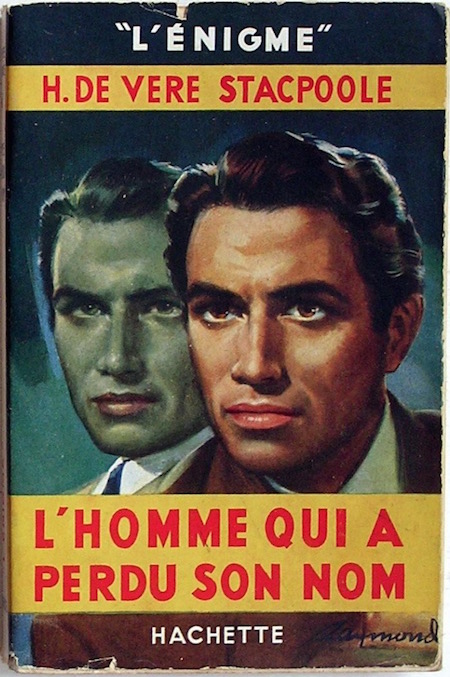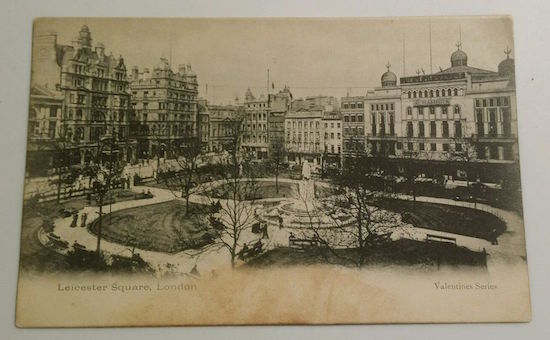THE MAN WHO LOST HIMSELF (3)
By:
February 17, 2018

This year marks the 100th anniversary of a forgotten Avenger/Artful Dodger-type adventure novel, The Man Who Lost Himself. A man down on his luck wakes up after a drunken night in London only to discover… that he has somehow slipped into the identity of a wealthy aristocrat! HiLoBooks is pleased to serialize this funny, thrilling yarn by H. De Vere Stacpoole — best known as author of The Blue Lagoon — here at HILOBROW.

A small bottle of Böllinger was the means, and the celebration was mostly done by Jones, for it came about that this stranger, Rochester, whilst drinking little himself, managed by some method to keep up in gaiety and in consequence of mind with the other, though every now and then he would fall away from the point, as a ship without a steersman falls away from the wind, and lapse for a moment into what an acute observer might have deemed to be the fundamental dejection of his real nature.
However, these lapses were only momentary, and did not interfere at all with the gay spirits of his companion, who having found a friend in the midst of the loneliness of London, and his twin image in the person of that friend, was now pouring out his heart on every sort of subject, always returning, and with the regularity of a pendulum to the fact of the likeness, and the same question and statement.
“What’s this, your name? Rochester! well, ’pon my soul this beats me.”
Presently, the Böllinger finished, Jones found himself outside the Savoy with this new found friend, walking in the gas-lit Strand, and then, without any transition rememberable, he found himself seated at dinner in a private room of a French restaurant in Soho.
Afterwards he could remember parts of that dinner quite distinctly. He could remember the chicken and salad, and a rum omelette, at which he had laughed because it was on fire. He could remember Rochester’s gaiety, and a practical joke of some sort played on the waiter by Rochester and ending in smashed plates — he could remember remonstrating with the latter over his wild conduct. These things he could remember afterwards, and also a few others — a place like Heaven — which was the Leicester Lounge, and a place like the other place which was Leicester Square.
A quarrel with a stranger, about what he could not tell, a taxi cab, in which he was seated listening to Rochester’s voice giving directions to the driver, minute directions as to where he, Jones, was to be driven.
A lamp lit hall, and stairs up which he was being led.
Nothing more.
SERIALIZED BY HILOBOOKS: Jack London’s The Scarlet Plague | Rudyard Kipling’s With the Night Mail (and “As Easy as A.B.C.”) | Arthur Conan Doyle’s The Poison Belt | H. Rider Haggard’s When the World Shook | Edward Shanks’ The People of the Ruins | William Hope Hodgson’s The Night Land | J.D. Beresford’s Goslings | E.V. Odle’s The Clockwork Man | Cicely Hamilton’s Theodore Savage | Muriel Jaeger’s The Man With Six Senses | Jack London’s “The Red One” | Philip Francis Nowlan’s Armageddon 2419 A.D. | Homer Eon Flint’s The Devolutionist | W.E.B. DuBois’s “The Comet” | Edgar Rice Burroughs’s The Moon Men | Charlotte Perkins Gilman’s Herland | Sax Rohmer’s “The Zayat Kiss” | Eimar O’Duffy’s King Goshawk and the Birds | Frances Hodgson Burnett’s The Lost Prince | Morley Roberts’s The Fugitives | Helen MacInnes’s The Unconquerable | Geoffrey Household’s Watcher in the Shadows | William Haggard’s The High Wire | Hammond Innes’s Air Bridge | James Branch Cabell’s Jurgen | John Buchan’s “No Man’s Land” | John Russell’s “The Fourth Man” | E.M. Forster’s “The Machine Stops” | John Buchan’s Huntingtower | Arthur Conan Doyle’s When the World Screamed | Victor Bridges’ A Rogue By Compulsion | Jack London’s The Iron Heel | H. De Vere Stacpoole’s The Man Who Lost Himself | P.G. Wodehouse’s Leave It to Psmith | Richard Connell’s “The Most Dangerous Game” | Houdini and Lovecraft’s “Imprisoned with the Pharaohs” | Arthur Conan Doyle’s “The Sussex Vampire.”
RADIUM AGE SCIENCE FICTION: “Radium Age” is HILOBROW’s name for the 1904–33 era, which saw the discovery of radioactivity, the revelation that matter itself is constantly in movement — a fitting metaphor for the first decades of the 20th century, during which old scientific, religious, political, and social certainties were shattered. This era also saw the publication of genre-shattering writing by Edgar Rice Burroughs, Sax Rohmer, E.E. “Doc” Smith, Jack London, Arthur Conan Doyle, Aldous Huxley, Olaf Stapledon, Karel Čapek, H.P. Lovecraft, Charlotte Perkins Gilman, Yevgeny Zamyatin, Philip Gordon Wylie, and other pioneers of post-Verne/Wells, pre-Golden Age “science fiction.” More info here.
READ GORGEOUS PAPERBACKS: HiLoBooks has reissued the following 10 obscure but amazing Radium Age science fiction novels in beautiful print editions: Jack London’s The Scarlet Plague, Rudyard Kipling’s With the Night Mail (and “As Easy as A.B.C.”), Arthur Conan Doyle’s The Poison Belt, H. Rider Haggard’s When the World Shook, Edward Shanks’ The People of the Ruins, William Hope Hodgson’s The Night Land, J.D. Beresford’s Goslings, E.V. Odle’s The Clockwork Man, Cicely Hamilton’s Theodore Savage, and Muriel Jaeger’s The Man with Six Senses. For more information, visit the HiLoBooks homepage.
